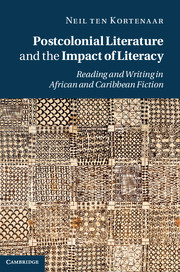 Postcolonial Literature and the Impact of Literacy
Postcolonial Literature and the Impact of Literacy Book contents
- Frontmatter
- Contents
- Acknowledgements
- 1 Introduction
- 2 The coming of literacy: Arrow of God by Chinua Achebe
- 3 The contents of the tin trunk: Ìsarà by Wole Soyinka
- 4 Mr Biswas finds a home in the world on paper: V. S. Naipaul
- 5 Literacy in the world not ruled by paper: Myal by Erna Brodber
- 6 Southern Africa's Houses of Hunger
- 7 Conclusion: the frontiers of writing
- Notes
- Bibliography
- Index
3 - The contents of the tin trunk: Ìsarà by Wole Soyinka
Published online by Cambridge University Press: 01 June 2011
- Frontmatter
- Contents
- Acknowledgements
- 1 Introduction
- 2 The coming of literacy: Arrow of God by Chinua Achebe
- 3 The contents of the tin trunk: Ìsarà by Wole Soyinka
- 4 Mr Biswas finds a home in the world on paper: V. S. Naipaul
- 5 Literacy in the world not ruled by paper: Myal by Erna Brodber
- 6 Southern Africa's Houses of Hunger
- 7 Conclusion: the frontiers of writing
- Notes
- Bibliography
- Index
Summary
In Chinua Achebe's novel No Longer at Ease, set in the late 1950s, Isaac Okonkwo, the aged father of the protagonist, has a room ‘full of old books and papers – from Blackie's Arithmetic which he used in 1908 to (his son) Obi's Durrell, from obsolete cockroach-eaten translations of the Bible into the Onitsha dialect to yellowed Scripture Union Cards of 1920 and earlier’. In the first half of the twentieth century, newly literate Africans often collected and saved all kinds of written material, including printed paper and their own notes and letters, investing these samples of writing with all their hopes for participation in the new field of the modern. Karin Barber has labelled this phenomenon ‘tin-trunk literacy’. Oduche's wooden box imprisons the natural, the sacred, and the indigenous, but a tin trunk filled with papers could be a ‘repository of values, the crystallized tokens and products of “civilization”, “progress”, “enlightenment”, and “modernity”’.
Isaac's adult son, Obi, looks with bemusement amounting to disdain on his father's collection, which time and insects have damaged and whose contents time has rendered ‘obsolete’. He sees in the yellowed pages an image of the older generation's outmoded, almost superstitious respect for the missionaries and the products of the colonizer. The title ‘Blackie's Arithmetic’ refers to the British publisher, but probably strikes the son as colonial condescension that his father had shamefully tolerated.
- Type
- Chapter
- Information
- Postcolonial Literature and the Impact of LiteracyReading and Writing in African and Caribbean Fiction, pp. 63 - 106Publisher: Cambridge University PressPrint publication year: 2011


